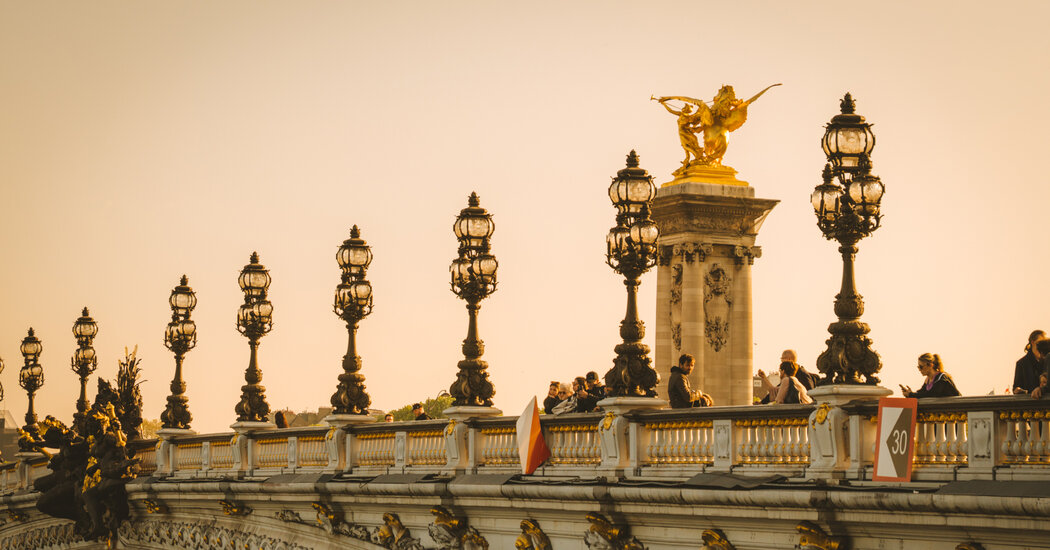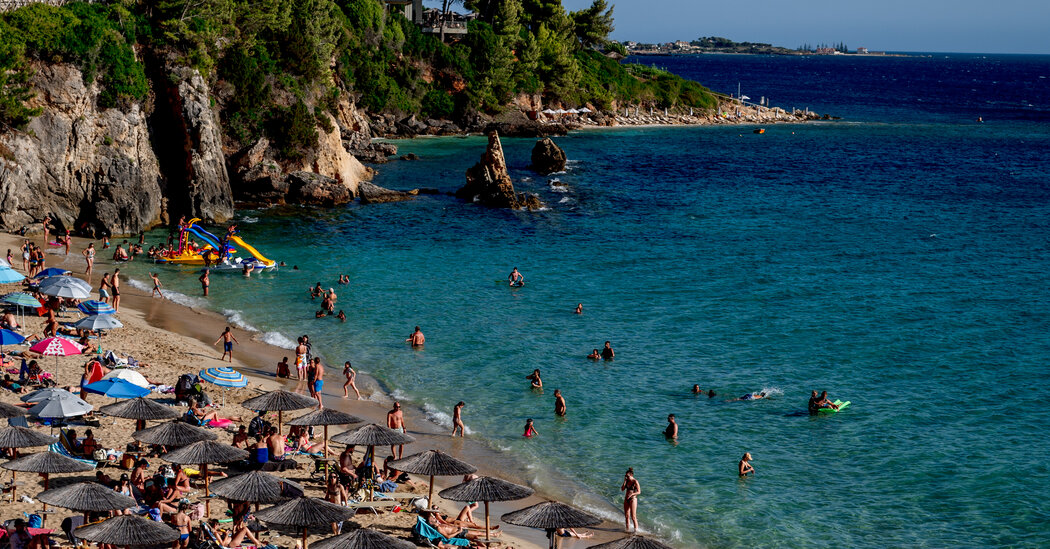My favorite Paris guidebook is not from Lonely Planet, Wallpaper or Monocle. In fact, I’m sure you have never heard of it. Titled “Paris Here I Come!” and published by the Afro-American Company in 1953, it is a slim volume, a mere 30 pages set inside a cheerful yellow cover emblazoned with a white line drawing of the Eiffel Tower.
Full of charming, conversational advice, the booklet describes Paris as “not a place, but a way of living — unique, lusty and uninhibited.”
The book’s author, Ollie Stewart, was my father’s uncle, born in Louisiana in 1906. He was the first Black reporter accredited as a war correspondent during World War II, and after the war, he lived in Paris until his death in 1977.
In the e-book “Race Goes to War,” Antero Pietila and Stacy Spaulding describe Uncle Ollie’s wartime travels for The Afro-American, a Black newspaper based in Baltimore. He covered skirmishes in North Africa in 1942, the battle for Sicily in 1943 and the invasion of Normandy in 1944.
He described conditions of segregated soldiers, attended trainings of the Tuskegee Airmen, and was “treated as a celebrity in The Afro and other Black newspapers.”
After the war, instead of returning home to the Jim Crow South, he stayed in Paris, where I met him for the first and only time in 1976. I was a small child, traveling with my parents, and I remember just fragments of visiting Uncle Ollie’s tiny apartment: his cigarette smoke, his piles of books and papers, his hulking black typewriter, his wrinkled grin.
Uncle Ollie died the next year. He never married, and had no children. But his writing about Paris reveals how he fell in love with the city. In addition to “Paris Here I Come!” he wrote lots of other unpublished Paris-oriented articles and essays, including a 4,000-word piece titled “Café Sitting: A Way of Life.”
So when I am in Paris, as I was last year to cover the Olympics, I seek out Uncle Ollie’s words.
Though “Paris Here I Come!” is over 70 years old, its approach feels energetic, fresh. “With money, a companion, a good stomach and an appreciation of good living,” the introduction reads, “Paris can be the most satisfying place in the world — even if you don’t speak the language!”
A few years ago, I stayed at a small hotel in the Ninth Arrondissement, near Montmartre. I checked to see what Uncle Ollie had to say about the nearby Place Pigalle. He wrote, “You’ll have your choice of nude shows, private exhibitions, smutty movies and men in dresses and women in pants.”
There were indeed signs for table dances, lap dances, lingerie and “spécialist aphrodisiaque.” More than one store was offering a sex toy in the shape of the Eiffel Tower.
But these days Pigalle is also home to a McDonald’s and is lined with bars and nightclubs frequented by the young and stylish. Bouncers on thresholds survey their circumscribed kingdoms as lines of patrons smoke and laugh. Snippets of pop songs leak from the doorways.
It’s impossible to know what Uncle Ollie would think about that. But I know he would have disapproved of the giant suitcase I packed to cover the Olympics. He was firmly against heavy luggage. “You may have to run to make a train, with no porter in sight,” he wrote, adding: “That’s when packing light will make you proud of yourself.”
The “Wine and Liquor” chapter of Uncle Ollie’s guide insists that “Champagne is the perfect drink.” And it still is.
For me, no Paris trip is complete without bubbly; I’m partial to French 75s and kir royales. I’ve sipped Champagne in front of the magnificent view at the sky bar on the 34th floor of the Hyatt next to the Palais des Congrès; in the cinematic, dimly lit wood-paneled bar at Le Meurice hotel; and outside in the Parisian air at various sidewalk cafes, just as Uncle Ollie did.
When treated to attentive service, I tip well, even though Uncle Ollie’s guide grumbles, “Americans usually spoil everything by giving too much wherever they go.”
Some of the restaurants and bars Uncle Ollie recommended closed ages ago. But during the Olympics, I took his advice and dined at Le Dôme in Montparnasse. Uncle Ollie described it as a good place to “sit and watch the world go by” and noted that Hemingway was once a regular.
As I slid a fork into a delicate piece of fish and admired the plates — octagonal, emblazoned with Art Deco lettering and an illustration of a harried server in a jacket and an apron — I wondered: With whom had Uncle Ollie dined? What had they discussed? He had interviewed Josephine Baker in Morocco during the war — had they also met for moules at midnight?
I like to imagine him at a table full of Black expats conferring over coffee while back home, Brown v. Board of Education dominated the news.
His guide, written by a Black man for a Black audience, acknowledged the racial cruelty of the United States in 1953 and informed readers of their rights. Of Parisian cafes, he wrote, “Just walk into any one you like. There is no segregation in France — in restaurants or any other place.”
But “Paris Here I Come!” doesn’t dwell too much on the country he left behind, instead encouraging readers to find pleasure in the city of light. The “Paris After Dark” chapter showcases Uncle Ollie’s nondiscriminatory and diplomatic character, as he writes:
“Not knowing your marital status, your church affiliation or the size of your bankroll, naturally I couldn’t tell you what to do when you go out to let your hair down. But if you’re like the majority of Americans who come to Paris, you want to see something naughty and do something naughty.”
Of course, some of the tips are outdated. Paris, and the world, have changed since 1953.
You can skip Uncle Ollie’s advice to get traveler’s checks, and the entire chapter about arriving in Paris via ship. His declaration that “the French never serve or drink water with meals” is no longer true, especially at establishments frequented by tourists. But the bookstalls by the Seine that lured him are still there, and as he wrote: “When you get tired of books and prints, you can sit on a bench and doze in the sun. It’s a good old French habit, and nobody will criticize you for not sweating your brains out on a job all day long.”
And Paris remains a great city to walk in. In the sightseeing section of his guide, Uncle Ollie wrote, “Taking a stroll and getting lost is the best way to learn a city.”
On one afternoon walk, I passed at least a dozen dazzling landmarks — the massive classical columns of La Madeleine; the brilliant, gold winged monuments on top of the Paris Opera; the Egyptian obelisk at the Place de la Concorde.
Walking the city reveals its musical rhythm — narrow, twisty side streets open up into noisy, bustling plazas like a tinkling melody giving way to a boisterous chorus.
To accompany this composition: visual delights. Triumphant angels, grimacing gargoyles, intricately wrought balcony railings, bright green shutters, gray mansard roofs punctuated with curious dormer windows. Beauty for beauty’s sake.
When I crossed the Pont de la Concorde, I wondered which bridge was Uncle Ollie’s favorite. After the brutality of the war, had he slowly strolled the Quai d’Orsay and marveled at the sheer extravagance of the Pont Alexandre III — with its cheeky cherubs, smiling nymphs and gold accents — as I was doing now?
On Page 21, Uncle Ollie wrote that if a reader required a recommendation not found in the guide’s pages, “you’ll have to look me up when you get to Paris, and we’ll see what we can do.”
He added:
My address is 7 rue du Laos. As far as time will permit, I would be glad to answer questions and show visitors around the city provided they recompense me equal to the amount I spend in their behalf.
So I walked to 7 Rue du Laos, taking in the stony Art Deco facade, built in 1925, with carved poppies and ornate ironwork accenting the doors and balconies.
It is just steps from the imposing 18th-century complex of the École Militaire and the broad, open park space of the Champ de Mars, which sits at the foot of the Eiffel Tower. I tried to imagine it as it might have been in 1953, or in 1976, when I met Uncle Ollie. Perhaps some businesses had changed names, but surely the streets and the cream-colored buildings were the same.
Although the city was full of tourists, I was the only person standing in front of 7 Rue du Laos, staring and taking pictures. It’s a pretty building, but not one of the stunning, notable monuments tourists flock to Paris to see.
To me, it is a landmark. I could imagine Uncle Ollie coming home late, flush with wine and gossip, entering the doorway under a shower of chiseled blossoms floating in the stonework above his head.
“You’re going to be a writer, just like your Uncle Ollie,” my father used to say, when I was young and dabbling in poetry and fiction. When I was sent to Paris on assignment, as Uncle Ollie once was, it felt destined.
My grandparents and my parents have all died, and none of them left much in the way of tangible assets. No property, no precious gemstones or wedding gowns. What they passed down is what they taught me, how they lived, how they loved.
And Uncle Ollie’s guide is a priceless heirloom. He bequeathed his passion for Paris, and for exploring the world with humor and gusto. His directive is to take hold of life and wring it dry, to blow past expectations and limits, laughing, to make your own rules and, for as many shimmering moments as possible, truly bask in the joy of living. As he wrote of spending an afternoon by the Seine:
You can take a boat ride down to the river, or shell out a few francs to rent a fishing pole from a Frenchman. You probably won’t catch a thing — but neither do the hundreds of people who fish daily in the Seine. But who cares? The sun is shining and you’re alive and what would the boys back home say if they could see you now?
Follow New York Times Travel on Instagram and sign up for our Travel Dispatch newsletter to get expert tips on traveling smarter and inspiration for your next vacation. Dreaming up a future getaway or just armchair traveling? Check out our 52 Places to Go in 2025.





